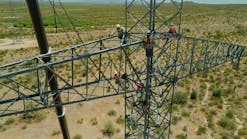The Trump administration has been in office since Jan. 20, but it has yet to put its stamp on the leadership of key federal energy agencies by placing its own nominees in power.
The Federal Energy Regulatory Commission (FERC) already lacks a quorum and it has a Democratic holdover as its acting chair. The Nuclear Regulatory Commission (NRC) could lose its quorum at the end of June when the current chair will see her term expire. In addition, the Energy Information Administration (EIA) is currently without an administrator nominated by the Trump administration as of May 8.
Starting with FERC, there are currently three vacancies on the five-member panel, which means FERC is currently without a quorum. This lack of a quorum makes it more complicated for FERC to approve major new projects like pipelines and electric transmission lines.
In February, FERC moved to blunt the impact of being without a quorum when it issued an order delegating additional authority to agency staff to continue certain agency operations in the interim. The delegation order also affirmed that all pre-existing delegations of authority by the FERC Commission to its staff continue to be effective.
Acting Chairman Cheryl LaFleur and Commissioner Colette Honorable, both appointed by Obama, are the remaining FERC panel members. Honorable’s term is set to expire at the end of June and she has indicated that she is not interested in securing another term.
FERC anticipates not having a quorum for an indeterminate period, but has a continuing responsibility to carry out its regulatory obligations under the Federal Power Act (FPA), Natural Gas Act (NGA), and Interstate Commerce Act (ICA), among other statutes.
There are currently no Republican members on the panel after a couple of departures over the past year or two. Republican Tony Clark left FERC in September 2016.
LaFleur, who is scheduled to serve FERC until June 2019, was tapped by the Trump team in late January. This is not LaFleur’s first stint as acting chairman.
Likewise, the NRC could soon be without a quorum.
The NRC, which regulates commercial nuclear power plants and other uses of nuclear materials, currently has a quorum. The NRC has three of five seats filled on its five-member commission.
The Commission as a collegial body formulates policies, develops regulations governing nuclear reactor and nuclear material safety, issues orders to licensees, and adjudicates legal matters.
Kristine Svinicki, who has served on the panel since March 2008, was named as chairman by the Trump administration in January. But her current term is scheduled to end June 30, 2017. Svinicki is a nuclear engineer and policy advisor who has worked with some leading Republicans in the U.S. Senate.
The other commissioners now at NRC were nominated by President Obama. Jeff Baran was sworn in as a Commissioner of the NRC in October 14, 2014, and is currently serving the remainder of the term ending on June 30, 2018.
Stephen Burns was sworn in as a NRC Commissioner in November 2014, to a term ending June 30, 2019. He served as the 16th Chairman of the NRC from Jan. 1, 2015, through Jan. 23, 2017.
EIA, TVA board still have openings
The administration has yet to nominate anyone for the top job at the ’the Energy Information Administration (EIA). Deputy Administrator Howard Gruenspecht (a career civil servant) is currently the Acting EIA Administrator.
EIA’s mission is to collect, analyze, and disseminate independent and impartial energy information.
Finally, the Tennessee Valley Authority (TVA) could soon be without a quorum on its board of directors. The federally-owned utility currently has three vacancies on its nine-member board.
But two of the remaining six board members are currently scheduled to have their terms end May 18. But when TVA board terms expire, directors may remain on the board until the end of the current congressional session (typically in December) or until their successors take office, whichever comes first.


